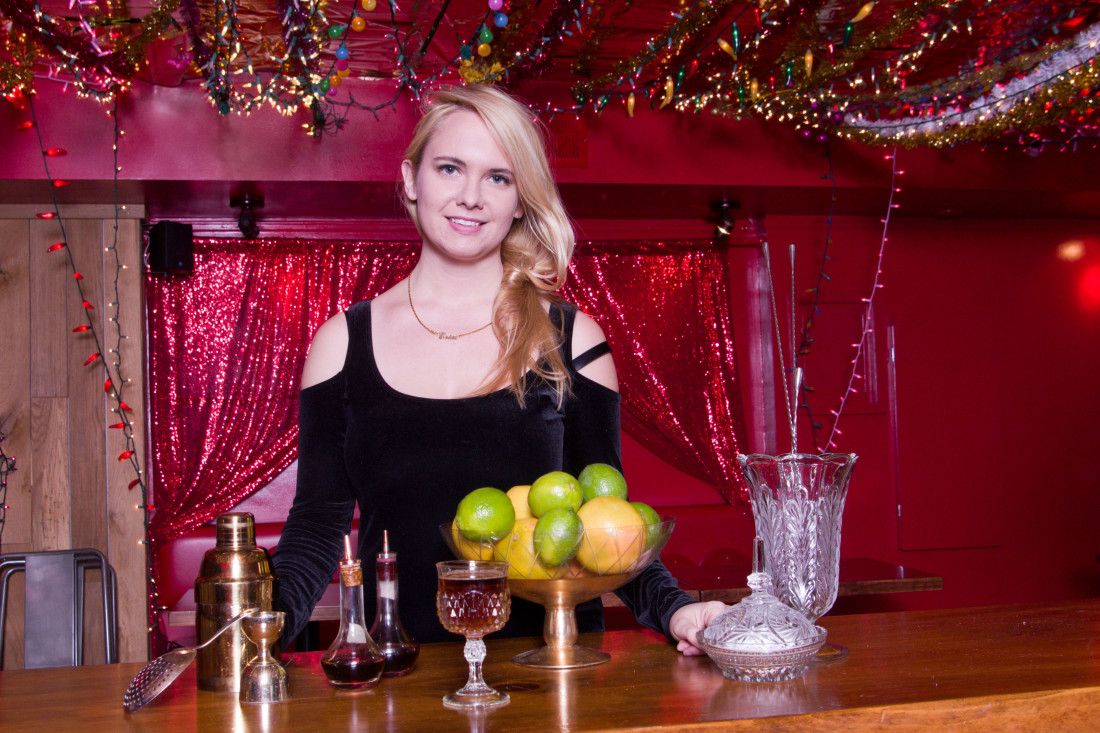
Bringing it home: Asheville bartenders offer tips for creating a personal bar
Posted on October 13, 2016 by Jonathan Ammons
It is safe to say that craft cocktails are becoming mainstream these days. In the past five years, they have transitioned from a niche market to a common offering, with Asheville going from just a couple of dedicated cocktail bars to nearly a dozen. It’s no longer an oddity to see a bar in a restaurant with a fancy Yarai mixing glass and long, pencil-thin bar spoons — in fact, it’s practically expected.
But it’s also expensive to drink cocktails out on the town. The average price is about $10, but it isn’t unusual to see tipples as high as $15 on a menu. So, unsurprisingly, it’s becoming quite a trend to deck out your own home bar, have a few friends over and spare everyone the cost of a pricey night out. But building a substantial bar can be expensive in its own right.
“Some people say they want to make a home bar, when really they just want to make four or five things,” says Jasper Adams, who runs the bars for Table and The Imperial Life. Adams also has a sizable home bar, stocking nearly 200 bottles. “But if you really want to have the versatility to come home and say, ‘I want to try this new thing,’ you’ve got to spend a couple hundred bucks.”
To be sure, curating a decent home bar is an investment, but the benefits are pretty obvious if you appreciate good hooch. “If you don’t buy the cheapest s**t, but just a little step above, you’re looking at $145,” Adams says. “And while that’s not nothing, you can literally make 185 cocktails from that.”
The basics
There are a few must-have staples for working through the basic classic cocktails such as the old fashioned, sidecar, negroni and margarita. And it’s worth noting that having most of these liquors on hand is important, even if you don’t personally enjoy them. Just because you don’t like gin doesn’t mean your guests won’t want a good negroni or Tom Collins.
Adams and cocktail writer Warren Bobrow helped Xpress assemble a list of items necessary to create a versatile home bar. A decent gin, they say, is a must, along with a good whiskey, blanco tequila, aged rum and a quality vodka.
Home bar shopping list:
One bottle each of the following:
Whiskey (bourbon or rye)
Gin (London Dry or equivalent)
Rum (preferably aged)
Tequila (100 percent agave)
Vodka
Sweet vermouth (Dolin, Vya and Punt e Mes are good brands)
Curacao (Cointreau)
Liqueur or amaro (Campari, ginger liqueur, maraschino, etc.)
Angostura bitters (add Peychaud’s and Reagan’s Orange, if possible)
Tools
A good bar spoon
Pint glass
One or two quality shaker tins (Koriko is a good brand)
Measuring jigger
Hawthorne strainer
Clamshell juicer
One or two square ice molds (Tovolo is a good brand)
Most spirits can be acquired at local ABC stores. For harder-to-find products, visit drinkupNY.com. Local wine stores carry bitters and vermouths. A good selection of quality bar tools and equipment is available at thebostonshaker.com.
As for the specifics of which ones to choose, that is largely a matter of taste, but there are some pitfalls to look out for. Tequilas and rums have far less regulation than other liquors, and it can be hard to be assured that what is in the bottle is actually what is on the label. For tequila, it’s often better to fork over a little more money for something with 100 percent agave — Lunazul is a great on-the-cheap option. For a decent aged rum, Mount Gay has always been worth its price tag. Bourbons are fairly heavily regulated in their production, and thus, cheaper bourbons are of a much higher quality than the cheapest rums or tequilas.
“You should always have a good vodka,” says Bobrow, author of Apothecary Cocktails, who is currently on tour promoting his latest book, Cannabis Cocktails. Bobrow tends to favor smaller, domestic craft distillers to the big corporate ones when it comes to many products — they may be a bit pricier, but they are American-made and usually sport their own quirky personalities.
With gin, however, Adams suggests looking for something made in the United Kingdom. “This might seem unfair to domestic producers,” he says, “but as a general rule for value, I think you are going to overpay for a boutique item when it comes to gin,” he says. “If it’s made in the U.K. and says London Dry on the bottle, it is probably going to be of a certain level of quality.”
Creative mixology
In addition to the base spirits, it is important to have a few more bottles in the bag to increase your ability to flex your creative mixology muscle. Sweet vermouth is, perhaps, the most diverse in the variety of its applications. “I would hold off on the dry vermouth,” advises Adams. “Sweet vermouth is in so many more drinks than dry vermouth is. It’s just that the martini is so ubiquitous that it gets an outsized role.” Dolin and Vya brands are great options for lighter vermouths.
“Having good fortified wines on hand can make a big difference,” agrees Erin Hawley, former bar manager for MG Road and current catering director for Chai Pani. “My go-to is always Bonal, and I also really love having Cocchi Americano on hand.” Note that vermouths should always be refrigerated, as it is wine and otherwise will go bad within a month.
Bitters are also a necessity, and the consensus seems to be that everyone absolutely needs a bottle of Angostura. In order to drastically expand that palate, Peychauds and Reagans Orange are crucial implements to help pad the toolbox. But if you are looking for something closer to home, try the lineup from Crude Bitters out of Raleigh.

